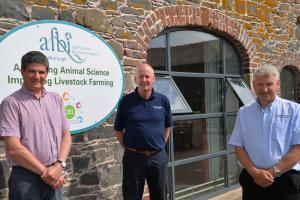Local animal nutrition companies partner with AFBI to improve nitrogen use efficiency in dairy cows
Date published:
Two of Northern Ireland’s leading animal nutrition companies, John Thompsons and Sons Ltd and Trouw Nutrition Ltd, are partnering with scientists at AFBI to develop strategies to improve nitrogen use efficiency by dairy cows.

Dairy cow diets contain nitrogen, mostly in the form of protein. However, nitrogen use efficiency by dairy cows is low, with only approximately 30% of nitrogen that is consumed being converted into milk protein. Much of the remaining nitrogen is excreted in manure, and this has a number of implications:
- Nitrogen is lost from manure (during housing, during manure storage and during field spreading) in the form of ammonia gas, and when deposited on sensitive habitats this can lead to biodiversity loss and soil acidification.
- Ammonia from manures can react with pollutants in the atmosphere to form fine particles, and these can cause respiratory problems in humans.
- Nitrogen in manure can also be lost as nitrous oxide, a potent greenhouse gas with a global warming potential almost 300 times greater than carbon dioxide.
- Nitrogen losses from manure to watercourses, primarily via leaching, can cause nutrient enrichment of fresh and coastal waters (the EU Nitrates Directive was established to address this issue).
- Protein is generally the most expensive component of dairy cows diets, so inefficient use of dietary nitrogen represents an economic loss. In addition, growing protein feeds such as soya bean threaten sensitive ecosystems in some parts of the world.
Recognising these challenges, DAERA, supported by co-funding from John Thompsons and Son Ltd and Trouw Nutrition Ltd, have commissioned AFBI to conduct a wide ranging research programme which is designed to identify strategies to improve nitrogen use efficiency in dairy cows.
Work which will be undertaken within this research partnership includes reviewing existing scientific literature to identify the following: relationships between dietary protein and ammonia excretion from manures, recent research on protein feeding, protein feeding systems adopted in Europe, and approaches to assess the protein status of cows based on the analysis of milk, blood and manure.
In addition, the research will encompass an extensive data modelling exercise to examine drivers of nitrogen use efficiency in dairy cows, with this work involving data collected from approximately 40 studies conducted at AFBI over the last 25 years. The project will also involve a series of full lactation studies in which the direct effect of protein nutrition on cow performance will be monitored. These studies will also examine the effects of diet on milk and blood urea levels, ration digestibility, and the rumen microbiome (the latter in partnership with QUB), and will seek to identify alternative approaches, such as the use of mid-infrared (MIR) analysis of milk to predict nitrogen use efficiency. The economics of adopting lower protein diets will also be examined.
There is currently considerable pressure, which will continue to increase, for the dairy sector to improve the efficiency with which dairy cows utilise dietary nitrogen. This major project, through the adoption of a holistic research approach, has potential to help improve nitrogen use efficiency within the local dairy sector, and to ultimately reduce nitrogen losses to the environment.
Notes to editors:
AFBI is an arms-length body of DAERA delivering research and development, diagnostic and analytical testing, emergency response capability and expert scientific advice for DAERA and other government departments, public bodies and commercial companies in Northern Ireland, and further afield.AFBI’s Vision is “Advancing the Local and Global Agri-Food Sectors Through Scientific Excellence”.AFBI’s core areas:Leading improvements in the agri-food industry;Protecting animal, plant and human health;Enhancing the natural and marine environment.